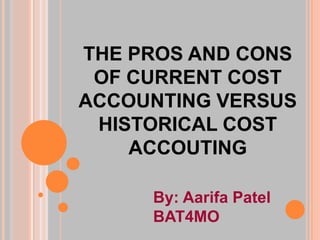
The pros and cons of current cost accounting slide
- 1. THE PROS AND CONS OF CURRENT COST ACCOUNTING VERSUS HISTORICAL COST ACCOUTING By: Aarifa Patel BAT4MO
- 2. WHAT IS ACCOUNTING? “The systematic recording, reporting, and analysis of financial transactions of a business” Businesses are crucial to accounting and must prepare financial statements
- 3. WHAT ARE ACCOUNTING CONCEPTS? “Ground rules of accounting that should be followed in preparation of all accounts and financial statements” These rules must be followed by accountants who work for any business or are entrepreneurs in their own firm
- 4. WHAT IS HISTORICAL COST ACCOUNTING? The “financial accounting based on the original cost of an item ignoring inflationary increases.” Records an asset based on its actual value without any adjustments for inflation On a balance sheet the values of assets are the Purchase cost of the asset
- 5. ADVANTAGES OF HISTORICAL COST ACCOUNTING •Simple •More conventional method •More reliable and verifiable •Information is free from any bias views (GAAP) “Historical cost accounting leads to absolute certainty and it fits in perfectly with the cash flow statement. This is due to the fact that it tells exactly what has been paid or received and therefore there is no doubt about balance sheet amounts”
- 6. CONTINUED... •Helps businesses estimate their future costs with the help of original values that are recorded in financial statements of past years •No scope for manipulation because the data is supported by sufficient evidences such as: invoices and receipts
- 7. DISADVANTAGES OF HISTORICAL COST ACCOUNTING •Does not provide enough information that is relevant to investors •Historical cost is interested in cost distribution, not the actual values of the asset •Does not have any adjustments for inflation “an asset purchased at the current point of time may be more expensive in future due to inflation”
- 8. CONTINUED... •The financial statements of a business present an old interest rate and outdated amounts •Intangible assets are not reported in the financial statements
- 9. WHAT IS CURRENT COST ACCOUNTING? •Also known as market value accounting •A “form of accounting in which the approach to capital maintenance is based on maintaining the operating capability of a business” Mutual funds usually price •Assets measured according to their shares daily based on replacement cost the last trade of the day •The adjustments called “market-to-market”
- 10. ADVANTAGES OF CURRENT COST ACCOUNTING •More relevant •Provides up-to-date information with financial market •Takes inflationary adjustments into account “Critics have argued market value (current cost) reveals economic realities that are hidden by historical cost accounting.”
- 11. CONTINUED... •Investors and creditors also prefer the market value accounting “The information about the market value at the reporting date, the changes in that value and the components of that change- all provide the investors with valuable information for his decision making.” •In financial statements , easier to view and determine whether the asset or liability is at risk or not
- 12. DISADVANTAGES OF CURRENT COST ACCOUNTING •Unreliable “if the information is unreliable, it should not be used to make financial decisions.” •Volatile •When market price of an asset or liability is not available, the value is estimated (inappropriate) “Cannot provide the same relevant and reliability in case of measuring the appreciation.”
- 13. QUIZ TIME!
- 14. 1. WHICH OF THE FOLLOWING DESCRIPTIONS DEFINES HISTORICAL COST ACCOUNTING? a) Records an asset based on market value b) Records an asset based on its actual value c) Does not record any asset or liability
- 15. WRONG Try again
- 16. CORRECT! Historical cost accounting records an asset based on its actual value without any adjustments for inflation
- 17. 2. IS THERE A LOT OF DEBATE GOING ON ABOUT THIS ISSUE? Yes or No
- 18. CORRECT! Yes, there is a lot of debate and controversy about whether or not to choose current cost accounting or to stick with historical cost accounting
- 19. WRONG Try Again
- 20. 3. WHICH OF THE FOLLOWING DEFINES CURRENT COST ACCOUNTING? a)An asset being reported at its original value b)An asset being reported at its depreciation value c)An asset being reported at its market value
- 21. CORRECT! In current cost accounting, assets are reported at market value
- 22. WRONG Try Again
- 23. 4. WHICH ONE OF THE TWO TECHNIQUES FOLLOWS THE GAAP? Historical cost accounting Or Current cost accounting
- 24. CORRECT! Historical cost accounting is free of any bias information
- 25. WRONG Try Again
- 26. BIBLIOGRAPHY WebFinance,Inc. (2010). Accounting. Retrieved September 22, 2010, from http://www.investorwords.com/48/accounting.html WebFinance,Inc. (2010). Accounting Concepts. Retrieved September 22, 2010, from http://www.businessdictionary.com/definition/accounting-concepts.html AllBusiness.com, Inc. (1999-2010). Business Glossary: Historical Cost Accounting. Retrieved September 24, 2010, from http://www.allbusiness.com/glossaries/historical-cost-accounting/4948578-1.html Scribd. Abdul Ahad. (2010). Is Market Value the Best Alternate to Historical Cost? Retrieved September 25, 2010, from http://www.scribd.com/doc/17844489/Market-Value-vs-Historical-Cost The Gale Group, Inc. (2010). Dictionary definition: Current Cost Accounting. Retrieved September 24, 2010, from http://www.highbeam.com/doc/1O18-currentcostaccounting.html Suite101.com. James Hutchinson. (2009). Market-to-Market Accounting Pros and Cons: Why it is Important how Investments are Valued. Retrieved September 24, 2010, from http://www.suite101.com/content/marktomarket-accounting-pros-and-cons-a101861